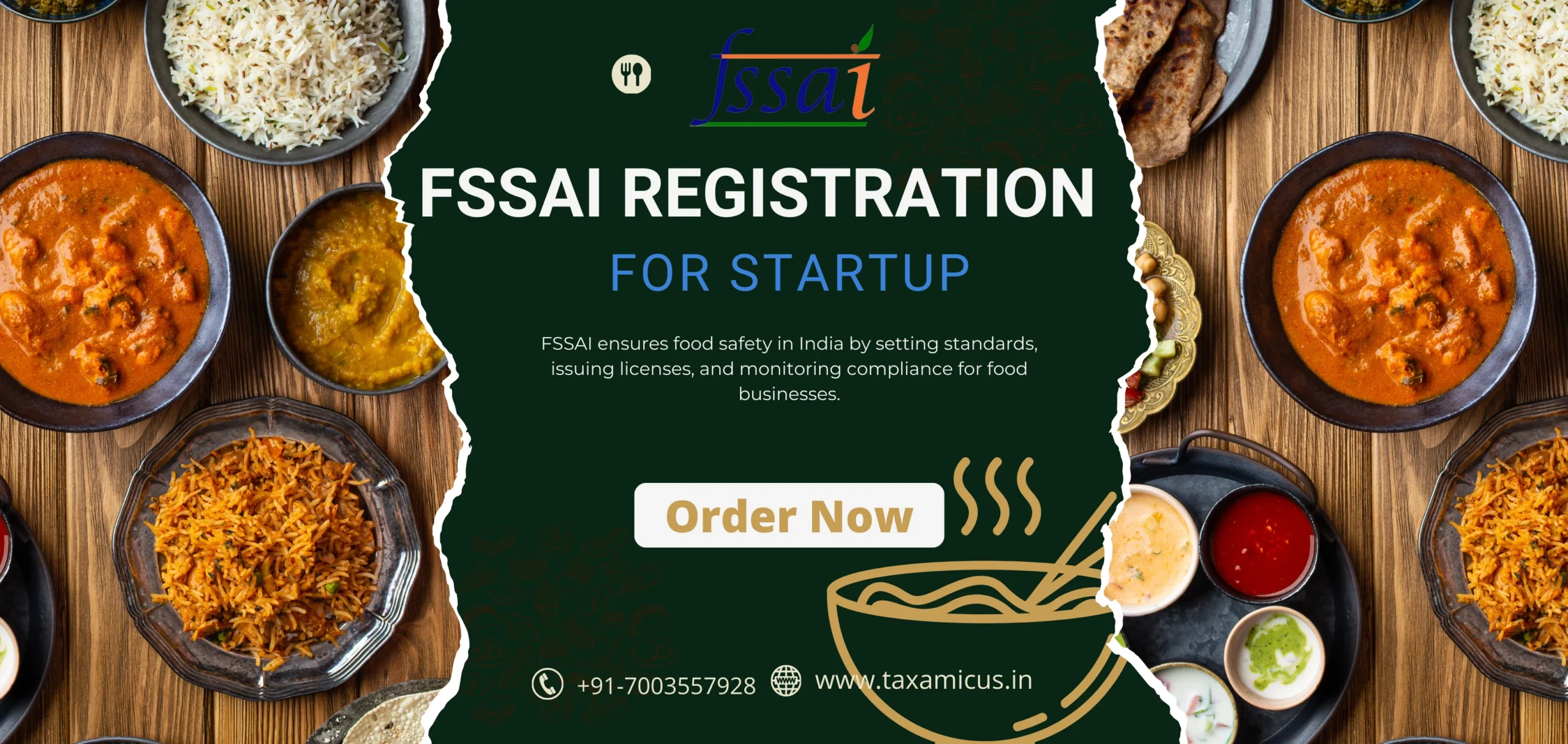Starting a food business is exciting, but it also involves numerous legal responsibilities to ensure the safety and quality of your products. For startups in India, obtaining FSSAI (Food Safety and Standards Authority of India) registration is one of the most critical steps in establishing credibility and operating legally. This blog will explain the importance of FSSAI registration for food-related startups and provide a step-by-step guide to obtaining it.
Why FSSAI Registration Matters for Startups
1. Legal Requirement
FSSAI registration is a mandatory compliance requirement for food businesses in India. According to the Food Safety and Standards Act of 2006, any entity involved in the manufacturing, storage, distribution, and sale of food products must obtain an FSSAI license. Operating without it can lead to severe penalties, including fines and even closure of the business.
2. Assurance of Food Safety
The FSSAI license indicates that your food business meets the safety standards set by the government, ensuring the health and safety of consumers. This registration certifies that your processes—from sourcing ingredients to manufacturing and packaging—comply with strict guidelines for food safety. For startups, this is vital for building a reputation as a safe and reliable brand.
3. Builds Customer Trust
Consumers are increasingly aware of food safety and quality. FSSAI registration provides customers with the assurance that your products have passed the necessary quality checks and comply with government standards. Displaying your FSSAI registration number on packaging can enhance trust and increase customer confidence in your brand.
4. Enables Legal Protection
Holding an FSSAI license provides your business with legal protection. In cases where food safety issues or disputes arise, an FSSAI license gives you a stronger legal standing, as you can demonstrate compliance with food safety regulations.
5. Access to Business Expansion Opportunities
FSSAI registration allows your business to access opportunities that would otherwise be challenging or impossible without it. For instance, retailers, distributors, and large-scale suppliers prefer working with licensed companies. Additionally, if you plan to export your products, having an FSSAI license is a prerequisite for international credibility.
Types of FSSAI Registration and Licenses
There are three types of FSSAI licenses, each catering to different sizes and scales of business:
Basic FSSAI Registration: For small businesses or startups with an annual turnover of less than ₹12 lakh. This is the simplest form of registration, suitable for petty food manufacturers and small-scale food businesses.
State FSSAI License: For medium-sized businesses with an annual turnover between ₹12 lakh and ₹20 crore. This applies to slightly larger food businesses such as mid-sized restaurants, food manufacturers, and transporters.
Central FSSAI License: For larger food businesses with an annual turnover exceeding ₹20 crore. This license is typically required by large manufacturers, importers, exporters, and food storage and processing units.
How to Obtain FSSAI Registration: Step-by-Step Guide
Step 1: Determine Your Business Category and License Type
The first step in the registration process is to identify the appropriate license for your business based on its scale and turnover. Use the above categorization as a guide. If your business is a startup, it may initially fall under the Basic Registration category, but as it grows, it might need a State or Central License.
Step 2: Gather Required Documents
Each type of FSSAI license requires specific documents. Ensure that you have all necessary documentation prepared before starting the registration process. The documents typically include:
- Form B (completed and signed)
- Passport-sized photos of the business owner(s)
- Proof of address (e.g., utility bill, lease agreement)
- Food safety management plan
- List of equipment and machinery used (for manufacturers)
- List of food products intended for sale
- Import/export code (if applicable)
Additional documents may be required for State and Central licenses, such as a water quality report, proof of turnover, and a no-objection certificate from the local authority.
Step 3: Fill Out the Application Form
Visit the FSSAI website (https://foscos.fssai.gov.in) to begin the online registration process. Choose the appropriate form based on your license type:
- Form A for Basic Registration
- Form B for State and Central Licenses
Complete the form accurately, ensuring that all details match your documents. Once submitted, you’ll receive an application reference number, which allows you to track your application status.
Step 4: Submit the Application and Pay Fees
Submit your completed application along with the required documents and payment of the applicable fee. The fee amount varies depending on the type of license:
- Basic Registration fee: ₹100 per year
- State License fee: Ranges from ₹2,000 to ₹5,000 per year, depending on the type of food business
- Central License fee: ₹7,500 per year
The payment can be made online through the FSSAI portal or via demand draft, depending on your preference.
Step 5: Inspection and Verification
For State and Central licenses, an FSSAI official may visit your premises for inspection. The inspector will verify that your business setup and processes align with FSSAI standards. Basic registration, however, usually doesn’t require a physical inspection.
Step 6: Approval and License Issuance
If everything meets FSSAI requirements, you’ll receive your FSSAI registration or license. Basic registrations may take up to 7 days, while State and Central licenses may take up to 30 days for approval. Once issued, your license is valid for a period of 1 to 5 years, depending on your choice during registration. Remember to renew your license before it expires.
Common Challenges in FSSAI Registration and How to Overcome Them
Delays in Approval
Approval delays can occur due to incomplete documentation or application errors. To prevent delays, double-check your application and ensure that all documents are in order before submission.
Inspection Issues
During inspection, issues may arise if the food safety standards aren’t met. Prepare your facility in advance to meet FSSAI guidelines, especially concerning cleanliness, hygiene, and equipment safety.
Renewal Oversights
Many startups forget to renew their FSSAI license, which can result in fines or penalties. Mark renewal dates on your calendar and start the renewal process a few months in advance to avoid lapses in registration.
FSSAI Compliance Tips for Startups
- Display Your FSSAI License Number: Make sure to display your FSSAI license number on all food product packages and marketing materials.
- Maintain Hygiene Standards: FSSAI compliance includes adhering to strict hygiene and safety standards. Train your employees on these practices to ensure compliance.
- Stay Updated on FSSAI Regulations: FSSAI regulations are updated periodically. Stay informed about any changes to ensure that your business remains compliant.
Conclusion
FSSAI registration is not just a legal formality for startups in India—it’s a cornerstone of building a trustworthy food brand. By ensuring that your food business complies with FSSAI standards, you protect your customers’ health, boost your business’s reputation, and position your brand for growth in the competitive food industry. Follow the steps outlined above, maintain ongoing compliance, and you’ll lay a solid foundation for your food startup’s success.
Our FSSAI Services

Basic Registration
Trademark registration is the process of legally securing exclusive rights to a brand name, logo, or slogan, protecting it from unauthorized use and ensuring nationwide recognition for the owner.

State/Central Registration
Trademark objection occurs when the registrar raises concerns or questions regarding a trademark application, typically due to potential conflicts with existing marks or lack of distinctiveness.

License Renewal
Trademark opposition allows third parties to challenge a pending trademark application, typically because they believe it may conflict with their own brand rights or cause market confusion.



